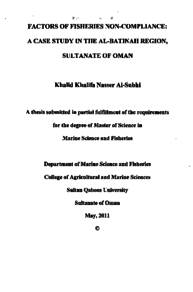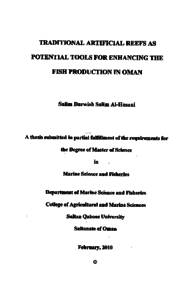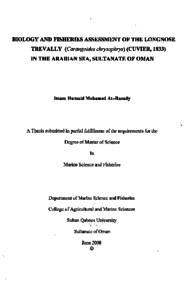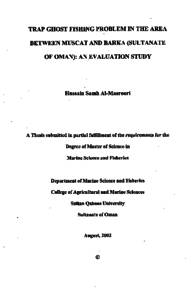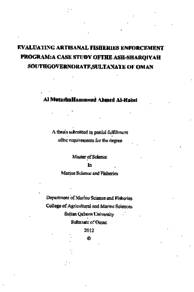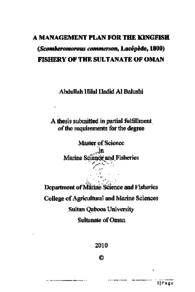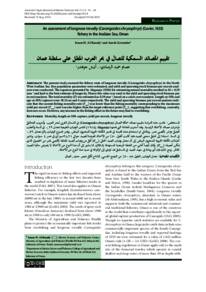Document
Factors of fisheries non-compliance : a case study in the Al-Batinah region, Sultanate of Oman
Publisher
Sultan Qaboos University
Gregorian
2011
Language
English
English abstract
The Sultanate of Oman has been facing both policy and operational challenges in regard to non-compliance in the fisheries sector. The main objective of this study was to identify the influences of the potential factors of fisheries non-compliance in the artisanal fisheries of the Al-Batinah region.
The study was performed in two wilayats of the Al-Batinah region, namely: Barka and Al-Suwaiq. A random sample of 100 fishermen was selected with 48 from Barka and 52 from Al-Suwaiq. In this study, random sampling was used to select respondents. A survey was carried out using face-to-face interview to collect data besides the direct observations. data and information collected on fisheries non-compliance were analyzed using descriptive and inferential statistical techniques.
Based on the results of this study, It is apparent that the average age of the interviewed fishers in the study areas was 40.6 years. Furthermore, about 90% of these fishermen involved in the fishery for more than 10 years and more than 60% of them found to be working as full-time. It was found that most of the interviewed fisheries (51%) were involved in more than one fishery and use different fishing gears. It was also found that the Fisheries extension services are characterized as the best mode for raising awareness of fisheries issues. While, the mass media (such as, newspapers, television and radio) and ministry notices are also playing an important role in creating more responsible attitudes towards compliance and resource use. The results showed that the management meetings and the Senat Al-Bahar Committee are not influential in communicating fisheries issue with fishers. Furthermore, the results showed that the most of the respondents do not follow these traditional rules when engage in fishing activities. The most preferred communication mode was mass media and the mobile short messages services (SMS). This perhaps indicates that there is a need for using advanced technologies to facilitate the communication with fishers in an accelerated and effective way. In most cases, fisher's perceptions regarding fisheries non-compliance factors varied from wilayat to wilayat. However, there were high levels of agreement among fishers indicating the importance of fisheries enforcement, legal procedural fairness, the role of the legal institution, peer pressure, and moral development in influencing fisher's compliance behavior.
The study recommended that the management authority should consider designing and planning effective compliance strategies and action plan, the multi-category and multigear natures of the fisheries, the differences in fishers' views and design appropriate strategies to promote resource stewardship and long-term sustainability to fishing communities.
It is hoped that the findings from this study will encourage further research in these field and help the fisheries managers in the Ministry of Fisheries Wealth in drawing up effective management strategies.
Member of
Resource URL
Arabic abstract
تواجه سلطنة عمان تحديات سياسية وعملية فيما يتعلق بعدم الإمتثال في قطاع الثروة السمكية. يوجه متخذي القرارات والباحثين في مجال الثروة السمكية جهودهم إلى تصميم الإستراتيجيات ذات الفائدة لإنجاز المستويات المثالية من الامتثال في الثروة السمكية. هدفت هذه الدراسة إلى معرفة التأثيرات المحتملة لعوامل عدم الإمتثال في مجال الثروة السمكية للصيادين التقليديين بمنطقة الباطنة.
تم تنفيذ الدراسة في ولايتي بركاء والسويق بمنطقة الباطنة بسلطنة عمان؛ حيث تم اختيار ۱۰۰ عينة عشوائية من صيادي الأسماك التقليديين بينهم 48 من بركاء و ۲ه من السويق. وتم تنفيذ الدراسة بواسطة الاستبيان من خلال المقابلات الشخصية المباشرة بالإضافة إلى أخذ بعض الملاحظات الميدانية مباشرة من قبل الباحث. تم تحليل البيانات والمعلومات المجمعة عن عدم الإمتثال في الثروة السمكية باستعمال التقنيات الإحصائية الوصفية والإستنتاجية
استنادا على نتائج هذه الدراسة تبين أن العمر المتوسط للصيادين الذين تم مقابلتهم في مناطق الدراسة كان 40 , 6 سنة. وقد وجد أن حوالي 90% من هؤلاء الصيادين يمارسون مهنة صيد الأسماك منذ أكثر من ۱۰ سنوات وأكثر من 60% منهم متفرغ للصيد. تبين أيضا أن 51 % يمارسون أكثر من طريقة واحدة لصيد الأسماك ويستعملون معدات صيد مختلفة. وقد وجد أن خدمات الإرشاد السمكي تعتبر أفضل نمط لرفع وعي الصيادين بقضايا الثروة السمكية. بينما تلعب وسائل الإعلام الجماهيري (مثل، الصحف والتلفزيون والراديو) والقرارات الوزارية دورا مهما أيضا في خلق المواقف الأكثر مسئولية نحو المحافظة على مصادر الثروة السمكية والإمتثال للقوانين. وأظهرت النتائج أيضا أن اجتماعات اللجنة المحلية لسنن البحر ليست مؤثرة في إيصال قضايا صيادي الثروة السمكية علاوة على ذلك، أظهرت النتائج بأن أغلب الصيادين لا يتقيدو بالقوانين الحرفية (سنن البحر). كذلك وجد أن نمط الاتصال الأكثر تفضيلا من قبل الصيادين كان الإعلام الجماهيري وخدمات الرسائل النصية القصيرة، ويشير هذا بأن هناك حاجة لاستعمال التقنيات المتطورة لتسهيل الاتصال مع الصيادين بطريقة أسرع وأكثر فعالية. وفي أكثر الحالات تبين بان تصورات الصيادين بخصوص عوامل عدم الإمتثال في الثروة السمكية يتفاوت من ولاية إلى أخرى. وقد كان هناك مستوى عالي من الاتفاق بين الصيادين في أهمية تنفيذ قرارات الثروة السمكية وتساوي الإجراءات القانونية ودور المؤسسة القانونية والضغوطات الاجتماعية والتطور الأخلاقي في التأثير على سلوك إمتثال الصيادين.
أوصت الدراسة بأنه يجب على السلطات الإدارية أن تأخذ في الاعتبار طبيعة الصيد المتنوع وتعدد معدات الصيد والاختلافات في وجهات نظر الصيادين والتنمية المستدامة لقطاع الصيد عند وضع إستراتيجيات إدارة الثروة السمكية لضمان إمتثال أفضل للقوانين السمكية.
من المؤمل أن تشجع نتائج هذه الدراسة إقامة بحوث أخرى في هذا المجال والتي قد تساعد مدراء الثروة السمكية في وزارة الثروة السمكية في رسم إستراتيجيات الإدارة الفعالة.
تم تنفيذ الدراسة في ولايتي بركاء والسويق بمنطقة الباطنة بسلطنة عمان؛ حيث تم اختيار ۱۰۰ عينة عشوائية من صيادي الأسماك التقليديين بينهم 48 من بركاء و ۲ه من السويق. وتم تنفيذ الدراسة بواسطة الاستبيان من خلال المقابلات الشخصية المباشرة بالإضافة إلى أخذ بعض الملاحظات الميدانية مباشرة من قبل الباحث. تم تحليل البيانات والمعلومات المجمعة عن عدم الإمتثال في الثروة السمكية باستعمال التقنيات الإحصائية الوصفية والإستنتاجية
استنادا على نتائج هذه الدراسة تبين أن العمر المتوسط للصيادين الذين تم مقابلتهم في مناطق الدراسة كان 40 , 6 سنة. وقد وجد أن حوالي 90% من هؤلاء الصيادين يمارسون مهنة صيد الأسماك منذ أكثر من ۱۰ سنوات وأكثر من 60% منهم متفرغ للصيد. تبين أيضا أن 51 % يمارسون أكثر من طريقة واحدة لصيد الأسماك ويستعملون معدات صيد مختلفة. وقد وجد أن خدمات الإرشاد السمكي تعتبر أفضل نمط لرفع وعي الصيادين بقضايا الثروة السمكية. بينما تلعب وسائل الإعلام الجماهيري (مثل، الصحف والتلفزيون والراديو) والقرارات الوزارية دورا مهما أيضا في خلق المواقف الأكثر مسئولية نحو المحافظة على مصادر الثروة السمكية والإمتثال للقوانين. وأظهرت النتائج أيضا أن اجتماعات اللجنة المحلية لسنن البحر ليست مؤثرة في إيصال قضايا صيادي الثروة السمكية علاوة على ذلك، أظهرت النتائج بأن أغلب الصيادين لا يتقيدو بالقوانين الحرفية (سنن البحر). كذلك وجد أن نمط الاتصال الأكثر تفضيلا من قبل الصيادين كان الإعلام الجماهيري وخدمات الرسائل النصية القصيرة، ويشير هذا بأن هناك حاجة لاستعمال التقنيات المتطورة لتسهيل الاتصال مع الصيادين بطريقة أسرع وأكثر فعالية. وفي أكثر الحالات تبين بان تصورات الصيادين بخصوص عوامل عدم الإمتثال في الثروة السمكية يتفاوت من ولاية إلى أخرى. وقد كان هناك مستوى عالي من الاتفاق بين الصيادين في أهمية تنفيذ قرارات الثروة السمكية وتساوي الإجراءات القانونية ودور المؤسسة القانونية والضغوطات الاجتماعية والتطور الأخلاقي في التأثير على سلوك إمتثال الصيادين.
أوصت الدراسة بأنه يجب على السلطات الإدارية أن تأخذ في الاعتبار طبيعة الصيد المتنوع وتعدد معدات الصيد والاختلافات في وجهات نظر الصيادين والتنمية المستدامة لقطاع الصيد عند وضع إستراتيجيات إدارة الثروة السمكية لضمان إمتثال أفضل للقوانين السمكية.
من المؤمل أن تشجع نتائج هذه الدراسة إقامة بحوث أخرى في هذا المجال والتي قد تساعد مدراء الثروة السمكية في وزارة الثروة السمكية في رسم إستراتيجيات الإدارة الفعالة.
Category
Theses and Dissertations

